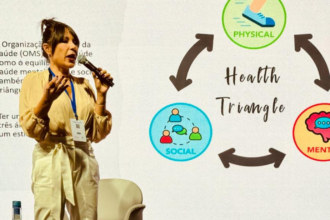When a child or adolescent reports having been abused, the first response is crucial to ensure the victim’s emotional and physical well-being. Psychologist Stephany Barcellos, specialized in cognitive behavioral therapy and neuropsychology, offers valuable guidance on how to act in this delicate situation.
The first step, according to Barcellos, is to create a comfortable, safe and calm environment for the conversation. It is essential to listen carefully, without interruptions, and remain calm, conveying security to the child or adolescent. Even though it is difficult, avoiding shock reactions is essential to the process.
Barcellos highlights the importance of taking everything that is said seriously, without showing doubts about the reportof the victim. Using simple and accessible language is essential for the victim to understand and feel comfortable expressing themselves. Pressure to obtain detailed information should be avoided, giving space for the victim to speak freely.
It is crucial to remember that the victim was not to blame for what happened. You should not ask directly about the details of the violence suffered or make them repeat the story several times. The priority is to keep the victim safe and protected.
If there is a fear that the aggressor may cause further harm to the victim, after obtaining this knowledge, it is essential to clearly communicate this to the competent authorities. Reporting abuse is a fundamental step in the process of protecting the victim. Stephany Barcellos emphasizes that adequate support and a careful approach can make all the difference for the victim of abuse.
According to CNN Brasil, a worrying statistic reveals that approximately 68% of cases of sexual violence against children involve family members and people they know as aggressors. Lucas Rocha, in a report published in May this year, presented equally alarming data. During the period from 2015 to 2021, Brazil recorded more than 200,000 cases of sexual abuse involving children and adolescents. These sad numbers include more than 83,000 reported cases of sexual abuse against children and more than 119,000 incidents of violence targeting teenagers, totaling a staggering total of 202,948 cases. The year 2021 marked a peak in notifications, with 35,196 cases, signaling the urgency of addressing this serious issue. Check out the interview with psychologist Stephany Barcellos!
What is the importance of creating an environmentcomfortable and safe for a child or adolescent who reports being abused? How does this influence how they share their experience?
The importance is enormous, because this space provides a true feeling of protection and respect, in which they feel heard. When there is freedom and safety to talk about what they fear or what happened, they open themselves up to other opportunities and can share their experiences. When there is trust, there will also be dialogue. Influence occurs because, in a safe environment, the victim feels encouraged to speak openly, without fear of judgment or retaliation. They realize that someone is there to support them and believe that their story will be taken seriously, without blame or fear.
How should an adult initially react when a child or teenager reports abuse? What are the guidelines for remaining calm and confident during this conversation?
When a child or teenager reports abuse, an adult must react calmly and empathetically. These two words may seem impossible at that moment, but they are extremely important for the victim! Initially, it is crucial to listen carefully, without interruptions, and show genuine concern. It is also important to avoid asking invasive or accusatory questions, as the victim deserves all the respect and love possible!
As mentioned previously, these two words together at this moment may seem impossible, but they are extremely necessary. What matters and what will help is to take a deep breath and focus on the victim, because at that moment they are the most important thing. Show compassion and empathy, use comforting language, and avoid extreme emotional reactions, such as shock or anger, that could frighten the victim.
Here are examples of words and phrases that convey compassion and empathy when talking to a victim:
- “I’m here for you.”
- “I’m sorry this happened.”
- “I believe in you and what you’re sharing.”
- “It’s not your fault at all.”
- “You’re brave for sharing this with me.”
- “I’m listening carefully, whenever you’re ready to talk.”
- “Let’s work together to find support and solutions.”
- “Your well-being is important to me.”
- “I’m here to support you in whatever decision you make.”
These words and expressions show the victim that you are there for them, listening and offering unconditional support.
Dealing with a report of abuse can be emotionally challenging. How can adults avoid shocked reactions while offering support to the victim?
It is important to seek emotional support for yourself, if necessary, before offering help to the victim.
- Prepare yourself emotionally: Before the conversation, take a moment to calm down and prepare yourself emotionally. Recognize that the conversation may be difficult and be aware of your own emotions.
- Stay calm: During the conversation, breathe deeply to stay calm. Try to control your facial expressions and body language so as not to show excessive surprise.
- Listen carefully: Focus on the victim and the story they are sharing. Avoid interrupting or expressing judgment. Show that you are fully present.
- Use comforting language: Use words and phrases that convey compassion and empathy. Saying things like “I’m here for you” can help the victim feel safer.
- Avoid intense emotional expressions: Try to keep your own emotions in check. Avoid showing anger, disbelief or shock, as this can scare the victim and make the conversation difficult.
- Offer nonverbal support: Use gentle eye contact, nod your head to show you are listening, and use reassuring gestures, such as reaching out to hold the victim’s hand, if appropriate and if they are comfortable with it.
- Be ready to seek professional help: Remember that you are not alone in this situation. If you feel like your own emotions are making it difficult to offer adequate support, consider involving a trained professional, such as a therapist or counselor, to help with the process.
Dealing with reports of abuse requires sensitivity and care, and these strategies can help create a supportive environment for the victim.
You mentioned the importance of not showing doubts about the victim’s report. How can we show that we believe in the child or teenager, even if the story is disturbing?
Demonstrating that you believe in the child or teenager, even if the story is disturbing, is extremely important, what you can do is:
- Listen without judgment: Show that you are listening attentively and without making hasty judgments. Avoid facial expressions that convey disbelief or shock.
- Validate their feelings: Acknowledge the victim’s feelings, even if the story is upsetting. Say something like, “I understand this must be very difficult for you” to show empathy.
- Support without question: Avoid asking detailed questions or questions that may seem critical. Instead, offer emotional support and encouragement so they keep sharing.
- Offer words of support: Use words that convey unconditional support, such as “I’m here for you”, “I believe in you” and “I will support you throughout this process”.
- Respect their story: Remember that each experience of abuse is unique, and the way the victim reports it may vary. Respect their time and how they choose to share.
- Avoid expressing doubts: Even if there are parts of the story that you find difficult to believe, avoid expressing doubts during the conversation. This can make the victim feel discredited and reluctant to continue.
- Encourage seeking help: After hearing the story, encourage the victim to seek professional help, such as therapists, counselors, or abuse support organizations. Make it clear that you are willing to support them in this process.
What is the most appropriate approach to obtaining information from an abuse victim without pressuring them to share traumatic details?
It is important to be empathetic, understanding and respectful of the victim’s rhythm. Be patient and recognize that the victim may need time to feel comfortable sharing. Avoid pressuring or rushing her. Instead, ask open-ended questions that don’t suggest specific answers and don’t force the victim into traumatic details.
Make it clear that the victim is in control of the conversation and can share whatever they feel comfortable with. Show that you are listening attentively, make eye contact, nod your head to show understanding, and use empathetic body language. Do not interrupt the victim while they are speaking and allow them to finish their thoughts before responding. Offer emotional support during the conversation, using words of encouragement and showing that you are there to support her.
Respect the victim’s limits. If she refuses to share something, don’t press her for more information. Avoid making promises you cannot keep and explain the importance of seeking professional help to deal with the situation. Always encourage the victim to seek support from professionals. The main goal is to create an environment of support and trust, allowing the victim to share in their own way and on their own time. This helps preserve your dignity and well-being.

How can we ensure that the child or teenager understands what is happening during the conversation? How important is it to use simple and accessible language?
It is essential to use simple language appropriate to their age. Avoiding the use of technical or complex terms, explaining the reason for the conversation clearly, frequently checking whether they are following along and willing to clarify doubts are important strategies. Furthermore, remaining calm and creating a safe and welcoming environment also contributes to better understanding.
The importance is to ensure effective and understandable communication, especially when dealing with children or teenagers. This makes information easier to understand, reducing the risk of confusion or misunderstandings. Additionally, accessible language creates a more welcoming environment and allows people to feel more comfortable sharing their feelings and concerns. In sensitive situations, such as dealing with abuse, clarity in communication is essential to ensure the victim can express their thoughts and needs appropriately.
In relation to reporting abuse, what measures should be taken to protect the victim from any future threat from the abuser?
Measures to protect the victim from any future threat from the attacker may include:
- Reporting to the appropriate authorities: It is essential to report the abuse to the police or responsible authorities so that legal action can be taken. This may include issuing restraining orders against the abuser.
- Safe shelter: In high-risk situations, it may be necessary to temporarily shelter the victim in a safe place, away from the attacker, ensuring their physical safety.
- Psychological support: Offering psychological support to the victim is essential to help them deal with the trauma. This may include therapy and professional counseling.
- Personalized security plan: In collaboration with the victim, it is important to create a personalized security plan that includes specific measures to protect the victim from future threats.
- Education about legal rights: Informing the victim about their legal rights is essential. This may involve clarifying what legal action can be taken against the perpetrator and how the victim can legally protect themselves.
- Support network: Establishing a support network, which may include friends, family and organizations that support victims of abuse, is crucial for the victim to feel supported.
- Legal support: Seeking legal assistance to deal with abuse, including obtaining legal protective measures, is an essential action.
Each abuse situation is unique, and protective measures must be tailored to the specific circumstances to ensure the victim’s safety.
What resources or organizations can be sought to provide adequate support to the victim after the abuse is disclosed?
In Brazil, after becoming aware of a case of abuse, the victim and those around them can seek support from several organizations and resources, including:
- Dial 100:This is a free and anonymous telephone answering service that allows you to report human rights violations, including cases of abuse. It is an important option for reporting abuse and obtaining guidance.
- Women’s Service Reference Centers (CRAMs):These are places that offer support to women who are victims of violence, including domestic and sexual violence. They provide legal, psychological and social assistance.
- Specialized Social Assistance Reference Centers (CREAS):These centers provide support to victims of violence, including children, adolescents, women and the elderly. They offer psychosocial support and guidance.
- Specialized Police Stations:Women’s Police Stations (DDMs) and Child and Adolescent Protection Police Stations (DPCAs) are places where victims can register reports of abuse and obtain assistance.
- Public defense:The Public Defender’s Office can provide free legal assistance to victims who need legal guidance in cases of abuse.
- Non-governmental organizations (NGOs):There are several NGOs in Brazil dedicated to supporting victims of abuse. Some examples include the Patrícia Galvão Institute, Childhood Brasil and the NGO Themis.
- Psychosocial Care Centers (CAPS):For psychological and mental health support, CAPS can offer treatment and support for victims of abuse.
- Support Groups:Participating in local or virtual support groups can be beneficial as it allows victims to share experiences and get emotional support from others who have been through similar situations.
- Hospitals and Health Centers:In cases of abuse with physical injuries, seeking medical attention is important for treatment and medical documentation.
- Guardianship Councils:For cases involving children and adolescents, Guardianship Councils can be contacted to assist in protecting the rights of these victims.
It is crucial to remember that each abuse situation is unique, and the choice of resources and organizations to reach out to may depend on the type of abuse, the victim’s age, and geographic location. Seeking professional help and guidance is essential to ensure adequate support for the victim.
Follow Stephany Barcellos on Instagram
*This article was prepared by Moreira Comunicação in Brazil, therefore some bodies listed may not be available in your country. If you have witnessed, suspect or know of any case of sexual abuse, contact local authorities and report it.





